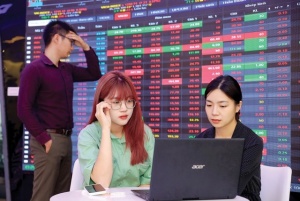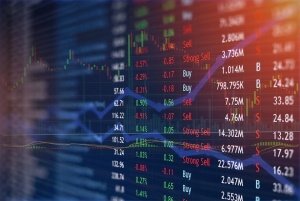INTERNATIONAL INVESTMENT
AND PORTAL

Vietnam's stock market stands at a pivotal moment in October, as the possibility of being upgraded by FTSE Russell from a frontier market to a secondary emerging marketdraws keen interest from both domestic and international investors.
Tran Khanh, regional director for Hanoi business, retail client division at Ho Chi Minh City Securities Corporation (HSC), said that this could be a memorable milestone. Vietnam's infrastructure, mechanisms, and policy reforms over the years have made significant progress, aiming for deeper integration into the global financial system.
"The information surrounding FTSE Russell's reclassification review, expected to be announced this month, is having a positive spillover effect on the market. While the official results have not yet been released, the fact that Vietnam remains on the watchlist for a potential upgrade shows that reform efforts are on the right track, particularly in terms of legal framework improvements, transaction and settlement mechanisms, and overall market transparency," Khanh said.
However, experts caution that to fully seize this upgrade opportunity, Vietnam must maintain and even accelerate its pace of reform. Dao Hoang Tung, head of analysis and investment advisory at HSC, emphasised that if Vietnam is recognised as a secondary emerging market , it would merely mark the beginning of a longer journey towards deeper global integration.
"To move further, Vietnam needs to ensure a stable and transparent investment environment while improving accessibility for foreign investors. In parallel with the upgrade anticipation, macroeconomic fundamentals in 2025 continue to provide solid support for the stock market," he highlighted.
Tung added that the government remains steadfast in its goals of macroeconomic stability, reasonable growth, inflation control, and flexible use of fiscal and monetary policy tools. The State Bank of Vietnam is oriented toward supporting liquidity in the economy, creating favourable conditions for business recovery and investment expansion. In addition, solutions to remove bottlenecks in the real estate market and accelerate public investment have shown effectiveness, creating positive spillover effects across various economic sectors.
From Tran Khanh's view, the combination of a stable macro-policy foundation and reclassification expectations is forming a "double lever" that is strengthening investor confidence and attracting fresh capital.
“Reforming the trading infrastructure and operational mechanisms, especially following the official deployment of the KRX system, is a key factor helping Vietnam align with international standards and pave the way for the development of modern financial products,” he said.
Over the past two decades, Vietnam's stock market has contained multiple growth cycles, clearly reflecting the country's progress in reform and integration. From the wave of state-owned enterprise equitisation and World Trade Organisation accession, to the surge of individual investors, each phase has been marked by expansion in scale, improved renewal, and enhanced market quality.
Tung believes that market development is not measured solely by capitalisation or investor count, but also by growing awareness, information transparency, and adaptability to global volatility. In addition, the investor structure is shifting positively.
"Individual investors still play a dominant role in liquidity, but the increasing presence of domestic institutions and foreign investors is helping create a more balanced market," he said. "The expansion of investment funds, insurance companies, and the trend toward indirect investment through new financial products are gradually laying the foundation for the next phase of sustainable growth."
If the upgrade becomes reality in the near future, it will not only carry symbolic meaning but also have tangible impacts, enhancing capital mobilisation, raising national credibility, and improving market transparency. In particular, foreign capital, especially from index-tracking funds, will have more reasons to enter Vietnam's market, thus driving stable and sustainable growth over the medium and long term.
 New catalysts emerge for Vietnam's stock market
New catalysts emerge for Vietnam's stock market
The prospect of a market upgrade, improving domestic fundamentals, will provide strong momentum for the Vietnamese stock market.
 Market rally sets positive tone for VN-Index outlook into 2026
Market rally sets positive tone for VN-Index outlook into 2026
Vietnam's stock market is gaining momentum on supportive policies and stronger sentiment. Tran Vinh Quang, CEO of Thien Viet Asset Management, told VIR the trend could last through 2026, but stressed portfolio efficiency over index milestones.
 Vietnamese stock market on cusp of development upgrade
Vietnamese stock market on cusp of development upgrade
A market upgrade for Vietnam is a pivotal milestone in its long journey towards building a transparent and efficient stock market, mobilizing capital for the domestic economy while also enhancing its appeal to international investors.
 Stock market on the cusp of key threshold
Stock market on the cusp of key threshold
Upcoming reclassification is energizing Vietnam's stock market, as investors brace for a new potential wave of foreign capital and long-term structural shifts.



















